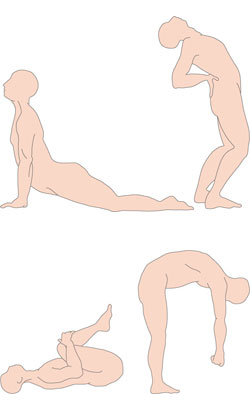Back problems and treatment of back problems. – What can the one do oneself about back problems, diagnosis of back problems, prevention of back problems and treatment of back problems. – Read more below and in the whole section about back and neck problems
In general about back problems
Most will at some point in their life experience back problems of some form, but in most cases the problem disappears without treatment. In most cases, the back problem is localized in the lower back or in the neck region and it is characteristic that back problems have a variable pattern. In the event of prolonged back pain one should consult a doctor who can examine the entire body and may. refer to X-ray or MRI scan.
Back problems constitute a major socio-economic costs due to sick leave, why it is very important to adopt a preventive approach.
Treatment at home

In many cases of back pain and for persons with a
propensity for back problems preventive back exercises
can be helpful. Here are examples of MacKenzie exercises
which amongst other are helpful against herniated discs.
In cases of mild to moderate back pain, it is important not to lie in bed for longer than 1-2 days, but on the contrary to move around and use the back until the pain threshold. You can supplement with a pain killer, to be able to move and to avoid over straining the affected muscles. Muscle pain can in some cases be relieved by heat treatment. When the pain decreases you should slowly begin back exercises and stretching excersises. A physiotherapist can give advice on the optimal training program.
It is important to make a preventive effort to avoid back problems. You have to think about having a correct working position, which will not strain the back. Also be sure to have varying working positions since repetitive work puts extra burdens on the back. Many back problems arise as a result of liftimg so a correct lifting technique, where heavy objects are kept close to the body and legs during the lift, is important.
Medical considerations
In case of longer lasting and very painful back problems you should seek medical advice. In back problems with muscle paralysis, sensory or muscle force reduction in the legs, affected bladder function and reduced bowel control you should always consult a doctor. The doctor examines the dorsal bones and muscles for tenderness. Similarly, the doctor looks at the dorsal position and movement in all directions. In addition, the examination will included a check of sensory and power disruptions in the legs in order to determine whether the nerves are affected.
In the event of sustained great pain and neurological effects the doctor will usually refer to X-ray or a CT or MRI scan and further examination by a Rheumatologist (specialist in joint diseases), a neuro-surgeon or an orthopedic surgeon. In addition, the physician may refer to physiotherapy and chiropractic treatment. If there is inflammation in joints or suspected cancer, your doctor may also take blood samples.
Læs denne artikel på dansk |